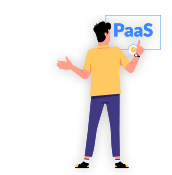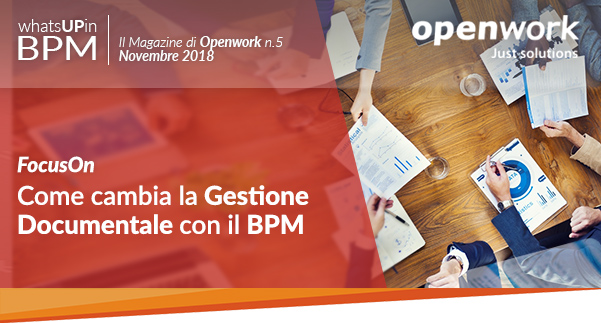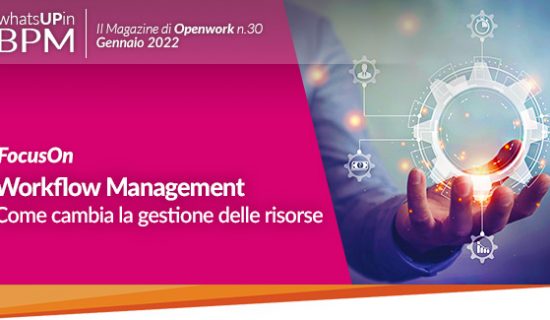4 CASES OF USE.
The increasing amount of documents, paperwork and business practices have always made the issue of document management a nagging and problematic one for a business. In this already arduous context, the latest laws on digitization and electronic invoicing present companies with an opportunity for innovation. But not all choices are going in the right direction, very often a classic document management is not sufficiently able to meet all the needs of a company. This is where greater flexibility is needed, which is only guaranteed by the opportunities for integration between document management and the approaches of a Business Process Management(BPM) software such as Jamio Openwork.
All of which allows for the optimization of communication and interaction modes and ensures the management of the entire document lifecycle: from its creation, to archiving to regulation-compliant storage.
But what is the advantage of document management with a BPM approach over common vertical software? Here are a few:
- Reducing management costs and streamlining internal processes;
- Collaborative approach with ability to supervise, approve, delegate documents being processed;
- Management of the entire lifecycle of documents, from their creation, to archiving and preparation for regulatory storage;
- Reduction of execution time through parallel machining;
- Possibility of coordination, including automatic coordination by process;
- Integration fully into a corporate business mechanism;
- Real-time monitoring;
- Ease and immediacy in customizing the solution to the
needs of companies (with model-driven, no-code approach); - Ease of integration with legacy & ERP systems.
CASES OF USE.
1.RESPONSE TO A TENDER SPECIFICATION
The case involves responding to a tender specification, a tender, a complex bid, a European project, a generic project.
Managers, operators from different organizations and/or from different organizational areas of the same organization contribute to the development of the document(s).
The BPM solution enables:
- Orchestrate practice with established timing and roles;
- Keeping track of individual sources and the final document;
- Automatically unify the document formatting
(with same headers, page number, updated indexes
etc).
2.ENTERING INTO A CONTRACT
A new contract must be established.
The contract carries with it a range of information managed in stand-alone documents, some of which are generic and some of which are dependent on the specific contract.
The BPM solution enables:
- Self-filling the contract with preconfigured clauses;
- Automatically govern the contract review and
approval process; - Manage the formatting of the final document automatically;
- Govern the final signing process by contractors.
3.CORPORATE POLICY MANAGEMENT
The management of data and communications in the context of labor relations is a long-standing issue and on the agenda, especially in companies with complex organizational charts, as they need constant and ongoing revisions.
The BPM solution enables:
- Keep track of the versioning of individual documents;
- Enable publication processes and communications
automated; - Manage access to document resources and communications
based on roles and permissions; - Automatically govern the review process and
approval of regulations and standards.
4.PRIVACY MANAGEMENT ACCORDING TO GDPR
The recent regulatory review induces companies to make new
important adjustments such as:
- Keeping track of signed documents;
- Managing deadlines;
- Managing a large number of users signing nomination papers;
- Allow access to the data subject to be able to change
their privacy consent settings and their info
master data etc.
The BPM solution enables:
- Manage templates for privacy policy and consents;
- Automatically create responsible acts of appointment;
- Enabling informed consent;
- Automatically compile a treatment log;
- Simplified management of document creation from
templates.
And so much more...
THE NEW FASHION SUPPLY CHAIN 4.0

The Italian textile and fashion sector is one of the most performing rings in the domestic market, ranking fourth in the world in terms of exports after China, Germany and Japan (ACIMIT elaborations on International Trade Centre data). However, in this large and important market sector, Italy is still quite behind in terms oftechnological and business process innovation.
New demand trends, well summarized by the phenomenon of fast fashion and characterized by rapid time to market, require production processes that are equally fast and capable of providing an immediate response to consumer needs.
But is it possible to enter Industry 4.0 even for an industry as analogue as the field of Fashion?
It is in response to this demand and a strong market need that four partners, combining their know-how in their fields, have come up with a solution for the Italian fashion industry and beyond:
Rossorame, a well-known brand that dresses celebrities, Calceviva a Fashion Design consulting firm, Ametlab a production laboratory, and Openwork, which has been providing platforms suitable for technological innovation via the Cloud for decades.
Their combined knowledge has created a cloud platform capable of keeping the large textile supply chain composed of pattern commissioning customers, manufacturing companies and textile suppliers connected in one collaborative process.
The immediate and easily perceived benefits for all stakeholders in the supply chain are:
- Integration of multiple external companies, each with its own IT systems;
- Timely receipt of information;
- Enhanced performance;
- Greater transparency and efficiency;
- Monitoring, regulation and organization of all processes (Production, Administrative etc...);
- Management performance measurement.
This was only possible through the BPM technologies of the Jamio Openwork platform.
The challenge of Industry 4.0 has begun, now it's the textile industry's turn.
40 THOUSAND € VOUCHER FOR INNOVATION MANAGERS
 The digital revolution is growing rapidly, and certainly also driving this innovation are the growing incentives in its favor. One of the latter concerns incentives to introduce into companies the Innovation Manager in order to study and implement the indispensable digitization projects needed to become Enterprises 4.0.
The digital revolution is growing rapidly, and certainly also driving this innovation are the growing incentives in its favor. One of the latter concerns incentives to introduce into companies the Innovation Manager in order to study and implement the indispensable digitization projects needed to become Enterprises 4.0.
The measure is contained in the latest budget law and provides for the presence of vouchers worth a maximum of 40 thousand euros to cover no more than 50 percent of the costs incurred in 2019 and 2020 for consulting an external party in order to "support the processes of technological and digital transformation."
The Voucher goes up to 80 thousand euros in the case of business networks. It can be combined with private initiatives and aid as it falls under the "de minimis" regime.
By March, the Ministry of Economic Development will draw up a list of Innovation Managers, professionals who meet certain requirements and are qualified for the role.
Once again, aninnovation opportunity for Italian companies to seize.
ONE MINUTE TO EXPLAIN HOW IT CAN CHANGE YOUR WORK WITH JAMIO
In an ever-changing market, you need technologies to follow your needs.
Here is Jamio's video.








